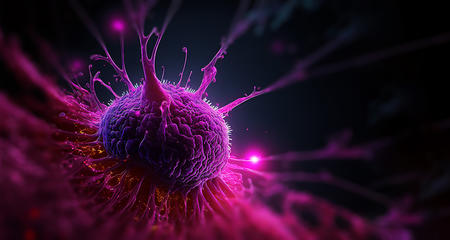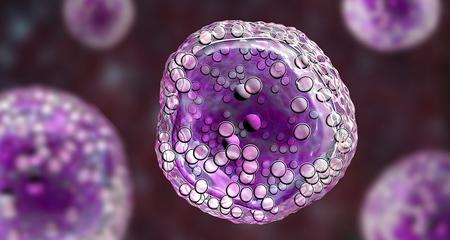Leukemias are cancers that arise in immature blood cells within the bone marrow. The disease can affect myeloid cells (which develop into red blood cells, platelets and certain types of white blood cells) or lymphoid cells (which develop into white blood cells known as lymphocytes).
Leukemia cells do not function like healthy blood cells, and they live longer than normal cells. Leukemic cells often “crowd out” normal blood cells, leading to symptoms of low blood counts. Every year about 45,000 people in the U.S. are diagnosed with a form of leukemia. The risk of developing leukemia generally increases with age, and nearly 90 percent of patients are adults.
CAR T-cell therapy is available for eligible patients with some types of leukemia. If you have leukemia, ask your doctor.
Acute Myeloid Leukemia
Acute myeloid leukemia (AML) is a fast-growing cancer that begins in immature myeloid blood cells. As AML cells proliferate, they block the production of normal blood cells.
Symptoms of AML include fatigue, paleness and shortness of breath (due to low red cell counts); abnormal bruising and bleeding (due to low platelets); and fevers and infections (due to low white blood cells). AML affects mainly elderly adults. About 10 percent of cases can be traced to radiation or chemical exposure.
Without treatment, patients with AML survive an average of three months. Treatment consists of intensive chemotherapy delivered by continuous IV for one month. The goal of this “induction” phase is to eradicate any detectable disease. Patients who achieve complete remission receive “consolidation” therapy aimed at eradicating any remaining cancer. This phase can include additional chemotherapy or a stem cell transplant, depending on the patient’s age, risk level and overall health.
Acute promyelocytic leukemia (APL) is a rare genetic sub-type of AML. It affects mainly younger adults, and it is more common in people of Hispanic descent. Patients are at high risk of clotting and bleeding, so treatment is delivered in the hospital. Chemotherapy consists of a combination of drugs that target the chromosomal abnormalities that are specific to APL.
Acute Lymphoblastic Leukemia
Acute lymphoblastic leukemia (ALL)—also known as acute lymphocytic leukemia — is a fast-growing cancer that starts in immature lymphoid blood cells. Since ALL cells block the production of normal blood cells, patients typically experience symptoms of low blood counts. Common problems include fatigue, infections, easy bruising, weight loss, fevers, enlarged spleen and enlarged liver. ALL can also cause abnormal masses in the chest or testicles.
ALL treatment is a multi-step process. First, patients receive induction chemotherapy, followed by several months of consolidation therapy. Since ALL cells can hide in the brain, patients next receive drug and radiation therapy to treat the central nervous system. The final step is maintenance therapy with a combination of chemotherapy drugs, lasting 18 months to 3 years. Some patients can also benefit from a stem cell transplant.
Chronic Lymphocytic Leukemia
Chronic lymphocytic leukemia (CLL) is a slow-growing leukemia that mainly affects older people. It is twice as common in men as in women. Patients may experience enlarged lymph nodes in the early stages, but you may not have any early symptoms. Other possible symptoms include weight loss, fevers, drenching night sweats and fatigue. The disease stage is based on white blood cell counts, lymph node involvement and other factors.
Early-stage CLL does not need treatment. We will monitor you closely through regular blood tests and physician visits. Treatment starts when the disease begins to progress. Indications to treat include a rapid increase in abnormal cells (doubling in less than six months) and the development of symptoms such as anemia, low platelets, fever, night sweats and weight loss.
CLL treatment made great strides in the last five years. We have several treatment options for patients with CLL, including ibrutinib, venetoclax, immune therapy and chemotherapy.
See upcoming dates and learn more about the CLL (Chronic Lymphocytic Leukemia) Support Group.
Chronic Myeloid Leukemia
Chronic myeloid leukemia (CML) is a slow-growing malignancy caused by a cancer cell mutation known as the Philadelphia chromosome. This chromosome produces a protein that signals CML cells to divide continuously.
Many patients with CML do not have any symptoms when first diagnosed — the disease is detected through a blood test performed for another reason. When symptoms do appear, they can include fatigue, unusual bleeding, weight loss, loss of appetite and excessive sweating. CML can also cause the spleen to enlarge, leading to symptoms of abdominal pain or fullness.
CML treatment was revolutionized with the introduction of imatinib (Gleevec) in 2003. Imatinib is an oral drug that targets the abnormal protein associated with the Philadelphia chromosome. By blocking this protein, the drug inhibits proliferation of CML cells and induces them to die. Other drugs such as dasatinib (Sprycel), nilotinib (Tasigna), bosutinib (Bosulif) and ponatinib (Iclusig) are also available to treat patients with CML.
Patients with CML currently have a life expectancy similar to the general population. A small proportion of patients who have been on treatment for a long time and have achieved a deep molecular remission may be eligible to discontinue therapy after discussion with their physician.
Other Diseases
Plasma cell leukemia is a variation of myeloma.
Leukemia Clinical Trials
Clinical trials give many patients access to innovative drugs and treatment approaches. Search our list of clinical trials for leukemia studies.
Virtual Visits Are Available
Safe and convenient virtual visits by video let you get the care you need via a mobile device, tablet or computer wherever you are. We’ll gather your medical records for you and get our experts’ input so we can offer treatment options without an in-person visit. To schedule a virtual visit, call 1-866-680-0505.
More to Explore





